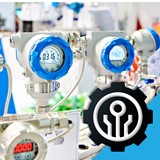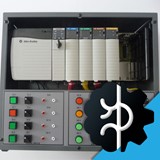Course Overview:
Delivery Options:
Length: 3 days (24 hrs)
Percent Hands-on: 50%
Description:
This course takes students who already have the knowledge gained in our Instrumentation & Controls course (IC) to the next level to begin doing detailed process control work. This course makes heavy use of process simulations with realistic controller configurations and settings and is designed for personnel in roles such as controls engineer, senior instrument or controls technician, process or automation specialists, etc. This course is fast-paced and assumes personnel have knowledge equivalent to IC course and some experience working with process control loops and associated field equipment.
Course Approach:
This course will utilize laptops with control simulations. Students will work with various fast-running simulated processes (flow, level, temperature, etc.) and trend screens that have insertable faults and problems, and variable process dynamics. Students will directly observe the impact of common control problems such as noise, process disturbances, process dynamics changes, etc., and will later analyze and determine control objectives and needs for several simulated systems, and will then set up, configure, test, and tune numerous control loops using various common methods (such as; Successive Approximation; Zeigler Nichols open/closed, Cohen-Coon, Lambda, etc.).
Benefits:
This course will help high-end professionals who need to analyze and solve process control problems to approach the problem in a safe and methodical way and to have insight to the issues and often overlooked details that could result in bigger problems and/or could lead them in the wrong direction. This course will also help personnel know when they are in the deep water and will help them avoid making serious mistakes that could jeopardize equipment, people, or the plant.
Course Outcomes:
- Understand process dynamics and its role in process control
- Understand noise and filtering and recognize the common mistakes and problems in filtering.
- Understand process time cycle, process lag, and deadtimes.
- Understand the basics of proportional, integral, and derivative actions as well as the common uses and issues with each.
- Recognize the differences of common PID algorithms and be able to determine which algorithm your systems utilize (needed to select proper tuning approaches and thumb-rule values).
- Be able to perform bump-test analysis of a process as part of a strategic tuning campaign.
- Know how to determine control objectives and compromises between fast and slow control system responses.
- Be familiar with common PID controller features and functions such as; bumpless transfer and bumpless tuning, variable gain selections, controller direction settings, controller bias and offsets, scaling of PV and OP, algorithm selections, ramp limiting & filtering, etc.
- Be able to recognize common control system problems including field problems (noise, actuators/valves, etc.), controller setup issues, incorrect control objectives, etc.)
Hands-on Exercises:
- Analyze the impact of various process dynamics (gain, deadtime, lag, etc.)
- Analyze the impact of different controller algorithms
- Perform a safe control system ‘test drive’ to observe and record important characteristics about the process interactions.
- Analyze and determine the control system performance objectives and compromises or limits for a system.
- Perform bump test analysis of a control system
- Perform various methodical tuning procedures
- Experiment with various controller functions and features.
- Solve problems and tune loops set by the instructor.
- Troubleshoot control system issues and faults as set up by the instructor.
Each student attending will be given a certificate of completion upon completing the course.
This course is extremely interesting and challenging and designed for people who are wanting to get to the next level of proficiency in the process controls & tuning world.
Related Courses
|
Dates |
Event Details |
Course Title |
Cost |
Register |
|
Oct 13-15, 2025 |
Midland, TX |
$1995 |
Registration Closed |
|
|
Oct 16-17, 2025 |
Midland, TX |
Instrumentation & Calibration (2-days) |
$1295 |
Registration Closed |
|
Oct 27-29, 2025 |
Dallas, TX |
$1995 |
Registration Closed |
|
|
Oct 30-31, 2025 |
Dallas, TX |
Instrumentation & Calibration (2-days) |
$1295 |
Registration Closed |
|
Nov 3-6, 2025 |
Dallas, TX |
$2495 |
Registration Closed |
|
|
Dec 2-4, 2025 |
Houston, TX |
$1995 |
Register | |
|
Dec 6-7, 2025 Dec 13-14, 2025 |
Houston, TX |
Basic Electrical Troubleshooting En español 4-days total over 2 weekends |
$1995 4-day Combo |
|
|
Dec 8-11, 2025 |
Houston, TX |
$2495 |
Register | |
|
Dec 15-18, 2025 |
Houston, TX |
$2495 |
Register |


